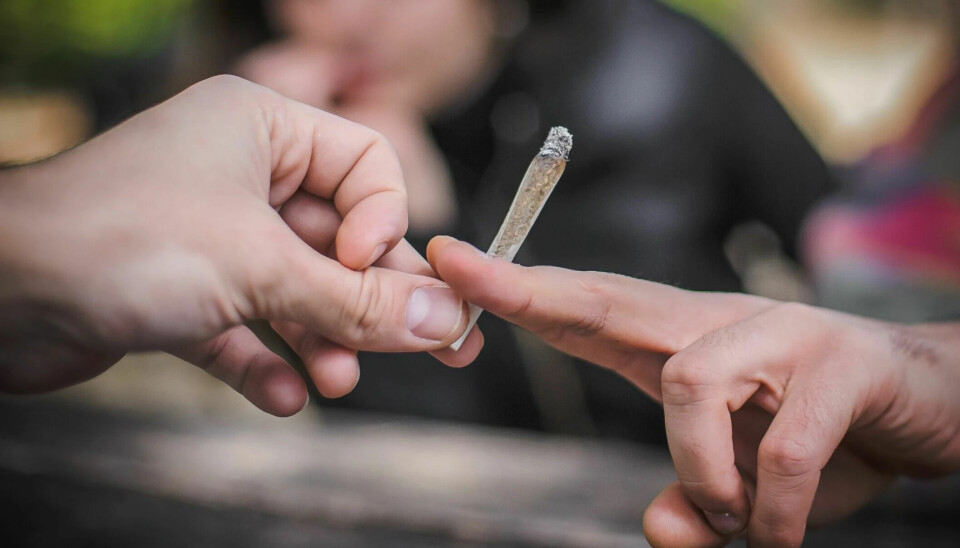
Norwegians are divided on whether to punish those who use cannabis
Punishments for sexual offenses and drug offenses are undergoing changes, but in very different ways. Researchers have now taken a deep dive into what people think and believe about law, justice, and punishment in these areas.
Recently, a new report about the public's perception of the legal system in Norway was released.
It is particularly interesting to study people's attitudes towards punishment in these areas, May-Len Skilbrei believes. She is a professor of criminology at the University of Oslo.
“The level of punishment has changed significantly for these offenses in recent years,” she says.
The level of punishment for sexual offenses has increased significantly.
For minor drug offenses, the trend has gone in the opposite direction. There has been partial decriminalisation.
Both of these changes have created debate in Norway.
Amid strong debate
When the Drug Reform Committee presented its report in 2019, they proposed full decriminalisation of the use and possession of all types of drugs for all user groups.
This was not accepted by a united Storting, the supreme legislature of Norway. The proposal was voted down.
But the Supreme Court of Norway has decided that those addicted to drugs will no longer be punished for their own use based on signals from the legislature. In other words, a partial decriminalisation has taken place.
You can read more about this in this article.
“Until now, we have not known what the population has thought about this issue. It was therefore particularly exciting to gain knowledge about this,” Ingrid Rindal Lundberg says.
She is a legal sociologist at the University of Bergen.

Have specifically considered cannabis
For researchers, it was most interesting to delve into people's attitudes towards punishment for cannabis use.
This is because cannabis is the most widespread drug. One in four have tried cannabis at some point in their lifetime, according to figures from the Norwegian Institute of Public Health (link in Norwegian).
There has been a change in the population's view on punishment for this offence, the researchers find.
This also applies to those who are not addicted to drugs, the so-called recreational users.
A divided population
Participants in one of the sub-studies are asked to take a position on the statement: "Possession of cannabis for personal use should not be punished".
The population proves to be highly divided on this issue.
Half believed that the use of cannabis should not be punished. One in three was for punishment.
This emerged in the representative survey of around 4,000 people aged 17 to 74.
Place of residence and age matter most
The researchers find significant differences in attitudes towards punishment for cannabis use, depending on where people live.
In the most central areas, 61 per cent are against punishment. In the least central regions, 38 per cent are against punishment.
There is also a clear generational difference in the legal perception of punishment for cannabis use.
In the age group between 16 and 39, 60 per cent are against punishment.
Young people believe that it is right to provide help, not punishment.
It is mainly the age group 50 to 59 who are in favour of punishing this offence.
“Perhaps it is because they belong to the parent generation of those who use cannabis,” Lundberg says.
Those who are older than this are slightly less concerned about punishing cannabis users.
Overestimated punishment
The researchers sent out a vignette to the participants. There they described a case where Jacob (21) was caught with one gram of marijuana.
The researchers asked what punishment the participants would give for this offense and what punishment they thought society would give.
60 per cent believed that such a case would result in a fine.
“That is actually a much harsher reaction than what is actually used today. According to judges, conditional non-prosecution is what is most commonly used,” Lundberg says.
Thus, there is little consistency between what people think the punishment is and the actual level of punishment in society, she concludes.
Strict penalties, but people want more
This is also the case with the punishment for rape.
But here, people often underestimate how high the penalty actually is.
The legislation on rape has changed a lot in recent years. The courts have significantly increased the level of punishment for sexual offenses in recent years.
Here, the courts are in line with people's sense of justice, the researchers find.
Those surveyed believe that rape is a serious offense that should be punished severely.
The researchers asked whether the punishment for rape in Norway is too severe, appropriate, or too lenient.
13 per cent thought it was appropriate. 82 per cent believe the level of punishment is too low.
Strong support for unconditional imprisonment
Women believe that the level of punishment for rape is too low more often than men.
And people with a long education more often believe that the level of punishment for rape is too low.
There is strong support for unconditional imprisonment for the offence, the researchers find. This is consistent with what happens in reality.
“This is definitely also the most common punishment that society gives,” May-Len Skilbrei points out.
In addition, there is also strong support in the population for the case to be resolved with financial compensation to the victim, in addition to punishment.
Little knowledge of the level of punishment
Young people, in particular, wanted even stricter punishments for rape than we have today.
Skilbrei believes that this indicates a lack of understanding of what the actual punishment level is.
When participants were asked what they thought the punishment for a rape would be, they underestimated how severe the punishment actually is.
When asked to propose an appropriate punishment for such offences, they often suggest a punishment below the actual level of punishment in Norway.
The researchers interpret this as a concern in the population that society is not doing enough for rape victims.
“We believe this may be due to dissatisfaction with the proportion of rape cases that are dismissed,” Skilbrei says.
———
Translated by Alette Bjordal Gjellesvik.
Read the Norwegian version of this article on forskning.no
































